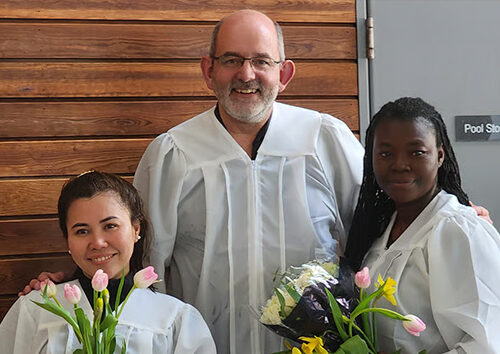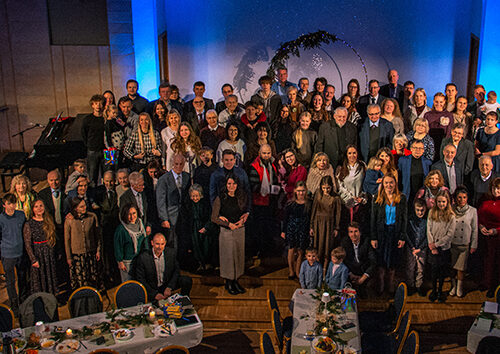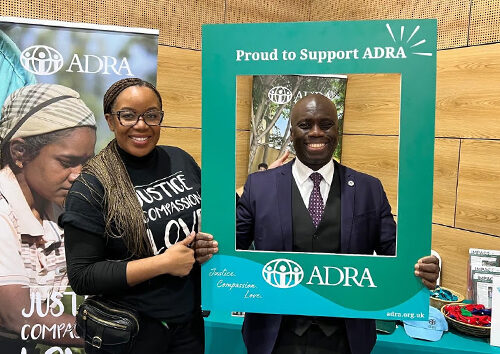12 November 2019 | Binfield, UK [Helen Pearson]
A General Election is looming in the UK and Brexit continues to divide the country, so the title of the November Diversity lecture at Newbold College could not have been more appropriate: Theologising Brexit – Anti-blackness and Christian Mission – A Liberationist and Postcolonial Critique.
Professor Anthony Reddie has devoted the past twenty years to teaching and writing Black Theology. His lecture was based on his newly published book in which he focuses on ‘the theological challenge presented by the post-Brexit epoch’ but also to its implication for Christian mission.
 Thus, the lecture was not about the merits or otherwise of membership of the EU. Rather Reddie’s focus was on the values held by both sides in the debate. As a native of Yorkshire, the place his Jamaican Windrush-generation parents settled, Reddie described himself as ‘a child of Empire’. His lecture focused on views of the British Empire, and concepts of Englishness that influenced the Brexit vote. “What kind of country are we?” he asked.
Thus, the lecture was not about the merits or otherwise of membership of the EU. Rather Reddie’s focus was on the values held by both sides in the debate. As a native of Yorkshire, the place his Jamaican Windrush-generation parents settled, Reddie described himself as ‘a child of Empire’. His lecture focused on views of the British Empire, and concepts of Englishness that influenced the Brexit vote. “What kind of country are we?” he asked.
Reddie argued that the British and, in particular, the English, have a sense of exceptionalism informed by their colonial history. At the peak of their imperial expansion, the British owned or controlled 24% of the world.
“The presence of the Empire was seen as proof of God’s blessing,” he said. This theology of English national superiority expressed by Shakespeare in his play Richard II, a few years after the British defeat of the Spanish Armada, has found its underscoring in the Church of England. Reddie suggested that this connection explains why Anglicans voted to leave the EU in larger numbers than any other Christian tradition in Britain.
 “Brexit,” he argued, “is a triumvirate of English nationalism, conservatism and white Christian notions of cultural identity.” Some Brexiteers were voting for a return to the kind of white England dramatised in the TV sitcom, ‘The Vicar of Dibley’. The professor quoted Gary Younge who said, “most people who voted for Brexit were not racists, but all racists did vote for Brexit”.
“Brexit,” he argued, “is a triumvirate of English nationalism, conservatism and white Christian notions of cultural identity.” Some Brexiteers were voting for a return to the kind of white England dramatised in the TV sitcom, ‘The Vicar of Dibley’. The professor quoted Gary Younge who said, “most people who voted for Brexit were not racists, but all racists did vote for Brexit”.
Reddie examined the roots of these views. Nineteenth-century British missionary, David Livingstone, identified the three Cs – commerce, Christianity and civilisation as the underlying rationale on which the British Empire was based. The lecture explored the close links between Christian mission and ‘whiteness’ – including the export of a ‘white Christ’. He suggested that the consequence of this identification has been a difficult relationship between Christian mission and non-white bodies seen as ‘other’. That difficult relationship is one of the roots of the pro-Brexit argument and, despite the decline of Christianity in the UK, a residual belief in British superiority to other nations makes itself felt in voting patterns.
 Now that immigrants from throughout the former Empire have come to the UK, some white British people, especially those in predominantly white areas, are resistant to recognising and accepting the ramifications of the UK’s history of empire. Reddie drew a comparison, “white people could colonise other peoples’ lands living as benign expats, but Black and Asian peoples from those colonised lands becoming immigrants in the UK is hotly contested.”
Now that immigrants from throughout the former Empire have come to the UK, some white British people, especially those in predominantly white areas, are resistant to recognising and accepting the ramifications of the UK’s history of empire. Reddie drew a comparison, “white people could colonise other peoples’ lands living as benign expats, but Black and Asian peoples from those colonised lands becoming immigrants in the UK is hotly contested.”
As a committed Christian, Professor Reddie concluded his observations with some reflections about the implications of his ideas for Christian mission. He offered an exhortation to move away from divisive thinking to the Pentecost model of “embracing and affirming difference in our post-Brexit life… In the Pentecost narrative,” he said, “there is no presumption of pre-eminence in terms of a particular language, culture, or expression.”
 Our view of Jesus is crucial and finding Him in ‘the other’ is the key. The professor recommended “the decoupling of Jesus from notions of white privilege and white supremacy,” reminding his enthusiastic audience of the Pauline view that “our identity is in Christ and the Body of Christ is a transnational entity that transcends borders and boundaries.”
Our view of Jesus is crucial and finding Him in ‘the other’ is the key. The professor recommended “the decoupling of Jesus from notions of white privilege and white supremacy,” reminding his enthusiastic audience of the Pauline view that “our identity is in Christ and the Body of Christ is a transnational entity that transcends borders and boundaries.”
 In the enthusiastic and wide-ranging Q&A that followed, Professor Reddie told the 50+ members of his audience that he had spent all his life – not just in society but clearly also in the church “trying to deconstruct authority and power”. He encouraged church members to seek inclusive congregations rather than meetings of the like-minded. He suggested the importance for congregations of the following three questions:
In the enthusiastic and wide-ranging Q&A that followed, Professor Reddie told the 50+ members of his audience that he had spent all his life – not just in society but clearly also in the church “trying to deconstruct authority and power”. He encouraged church members to seek inclusive congregations rather than meetings of the like-minded. He suggested the importance for congregations of the following three questions:
- Who is being disadvantaged here?
- What do we need to do differently for people who have different needs?
- Who is not here and is not being served?
People were still gathered in discussion an hour after the end of proceedings! Hardly surprising then that Professor Reddie described the group as ‘the most engaged audience’ of the book tour so far!
This lecture can be viewed on the Newbold College of Higher Education Facebook page.
tedNEWS Staff: Victor Hulbert, editor; Deana Stojković, associate editor
119 St Peter’s Street, St Albans, Herts, AL1 3EY, England
E-mail: [email protected]
Website: www.ted.adventist.org
tedNEWS is an information bulletin issued by the communication department of the Seventh-day Adventist Church in the Trans-European Division. Readers are free to republish or share this article with appropriate credit including an active hyperlink to the original article.

![[Photo credit: Asun Olivan] Diversity Lecture Nov 2019 with Professor Anthony Reddie](https://ted.adventist.org/sitenews/wp-content/uploads/2019/11/images_news-2019_Diversity_Lecture_Nov_2019-9.jpg)


